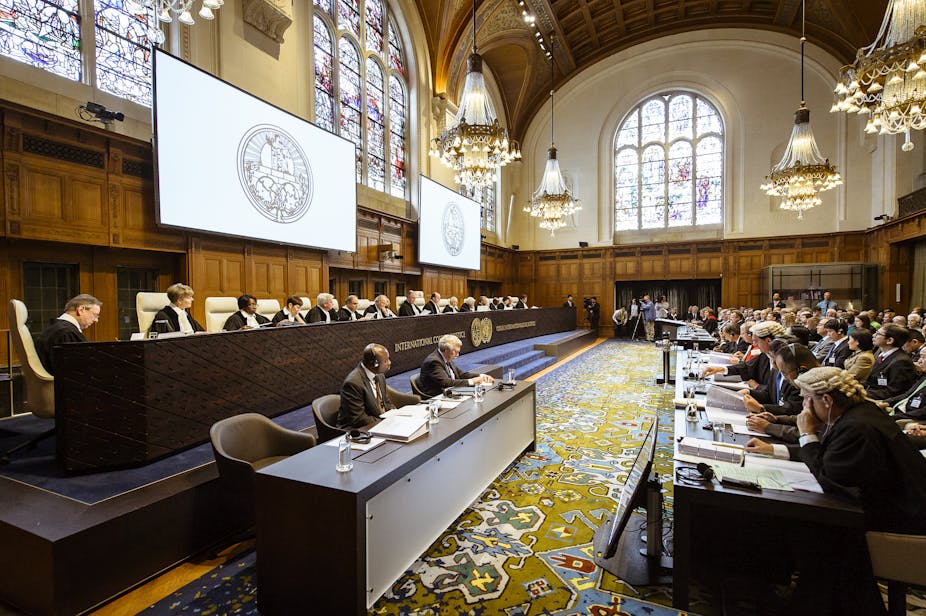Australia had its second (and last) chance this week to argue against Japan’s whaling program in the International Court of Justice (ICJ).
But before it did, New Zealand appeared before the Court to provide its take on Japan’s obligations under the International Convention for the Regulation of Whaling.
New Zealand intervenes
Japan issues special whaling permits for its whaling program (JARPA II) under the Whaling Convention. New Zealand’s Attorney-General Christopher Finlayson argued this system of special permits is integral to collective regulation under the Whaling Convention, and was exclusively for scientific research.
But New Zealand countered Japan’s case, saying that the provision of special permits was “not an exemption” from the rest of the convention, or from the collective decision-making of the International Whaling Commission.
New Zealand also provided an history of the genesis of the 1946 Whaling Convention, which it said was rooted in the “rampant over-exploitation” of whales prior to the Second World War.
New Zealand argued the negotiation of the convention was a “common endeavour”, but initial actions taken under it were “too little, too late”. The object and purpose of the convention established “a system of collective regulation for the conservation and management of whales”.
Further, they said that the “common purpose” of the parties to the whaling convention had been overshadowed by controversy over Japan’s current whaling program.
Cultural imperialism
Last week Japan accused Australia of cultural imperialism, and of backing action by activist group Sea Shepherd.
In Australia’s opening remarks Attoney-General Mark Dreyfus flatly denied these arguments. He said Japan had “made many baseless allegations of no relevance to the dispute before the Court”.
Mr Dreyfus also said that Australia had not “colluded” with New Zealand to bring the case before the International Court of Justice.
Japan, Mr Dreyfus said, had used the special permit provision of the Convention as a “rubber stamp” to authorise continued commercial whaling.
The use of the expert witness
Australia used some time on its last day referring to the evidence of Japan’s sole expert witness Professor Lars Walløe of University of Oslo in Norway. Prof Walløe’s expert evidence, Australia said, supported its case – not Japan’s.
Justin Gleeson, Australia’s Solicitor-General, said that Prof Walløe had acknowledged that there was a lack of scientific justification for the numbers and species of whales to be taken under Japan’s whaling program.
Mr Gleeson quoted Prof Walløe as saying in evidence “I did not like the proposals regarding Fin and Humpback whales” and “I don’t really know how they calculated sample sizes”.
Random hunting and gathering
Australia followed by arguing that Japan’s whaling program was unnecessary and indefensible, and that the Special Whaling Permit allowed “random hunting and gathering”.
Three species of whale are hunted under Japan’s whaling program: Humpback, Fin and Minke whales. Australia said Japan had failed to establish why Humpback and endangered Fin whales needed to be killed, or justify why the number of Minke Whales killed had been doubled.
Japan currently permits 850 Minke Whales be killed each year. Australia quoted Prof Walløe again as saying that three or four hundred Minke Whales “was a large number”.
The inter-species competition model put forward by Japan to justify its program “remained illusory”, Australia said. Lethal whaling was not required to improve the management model developed by the Whaling Commission to conserve whales.
Is killing whales necessary?
In response to a question put to Australia by a member of the ICJ on whether Australia “categorically opposed” lethal whaling, Australia said that it supported legitimate Aboriginal subsistence whaling, and that Australia would not oppose lethal whaling for scientific purposes “if it were absolutely needed”.
What is science – a heap of body parts?
Professor Philippe Sands of University College London argued that Japan’s whaling program was not “a program for the purposes of scientific research”. He said that Japan’s arguments on this point amounted to: “What Japan says is science is science”.
He went on to counter Japan’s arguments that the scientific committee of the International Whaling Commission had endorsed Japan’s whaling program, saying that the evidence clearly demonstrates that the scientific committee has not supported it.
Australia said that Japan had “closed its mind to non-lethal alternatives to killing whales”. Australia argued that the data obtained from the Japanese whaling program was not, in any event, useful to, or required by the Whaling Commission.
What do tuna and whales have in common?
This is not the first time Japan has been in court over the exploitation of marine resources. Professor James Crawford of Cambridge University referred to an earlier international dispute about the fishing of Southern Bluefin Tuna.
In that case, Australia had not argued that Japan had been acting “in bad faith” but that it subsequently transpired that Japan had been “deliberately and substantially overfishing its quota of tuna”.
In arguing whether Japan’s whaling permits are issued in “good faith” or not, Prof Crawford said, “Japan does not own the whales” and those resources should not be allocated “to a State good at concealment”.
Australia concludes
In summing up Australia’s case, Mark Dreyfus emphasised the fact that Australia and Japan “were friends” and that the Court had an important role as the final arbiter of disputes. He said the case was about the environment, endangered species and science and “Australia respectfully requests the Court to bring Japan’s whaling program to an end.”

